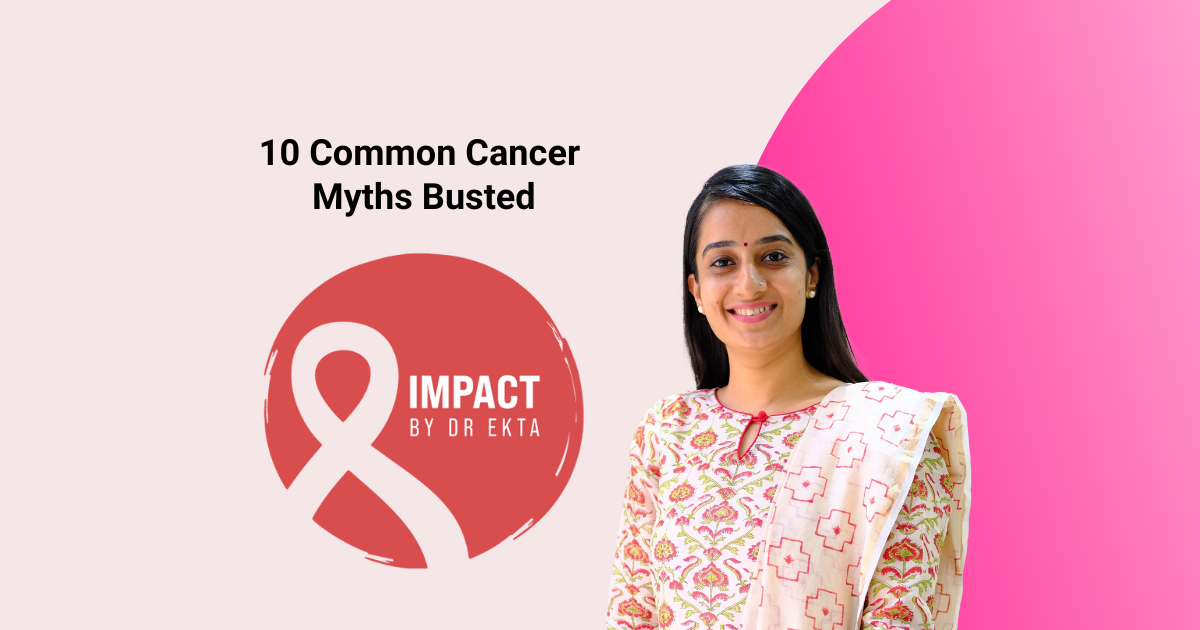When it comes to cancer, misinformation can be just as dangerous as the disease itself. Myths and misconceptions often cause confusion, fear, or delay in diagnosis and treatment. Whether you’re a patient, caregiver, or simply someone trying to understand the disease better, it’s important to separate facts from fiction. In this blog, we’ll break down 10 common cancer myths and uncover the real facts behind them. Understanding the truth can help you make informed decisions about prevention, early detection, and treatment.
Key Takeaways
- Cancer is not always caused by lifestyle choices
- Pain is not always an early symptom
- Early detection plays a crucial role in successful treatment
- Many cancers today are treatable or manageable
- Not all tumors are cancerous
Myth 1: Cancer is always fatal
- Many people believe that a cancer diagnosis is a death sentence
- In reality, survival rates for several types of cancer have improved significantly due to advances in treatment
- Early-stage cancers like breast cancer, prostate cancer, and thyroid cancer often have high cure rates
Myth 2: Cancer is contagious
- Cancer cannot be transmitted from one person to another through casual contact
- While some viruses (like HPV or Hepatitis B) can increase cancer risk, the disease itself is not infectious
Myth 3: Only people with a family history get cancer
- While family history can increase risk, most cancer cases occur in people with no genetic predisposition
- Environmental factors, lifestyle choices, and aging also contribute to cancer development
Myth 4: Cancer treatments always cause unbearable side effects
- Modern cancer medications and supportive therapies have improved significantly
- Side effects can often be managed with proper care, allowing many patients to maintain quality of life during treatment
Myth 5: A lump always means cancer
- Not all lumps are cancerous—many are benign
- However, any new lump or change should be evaluated by a medical professional to rule out malignancy
Myth 6: Pain is an early sign of cancer
- Many cancers do not cause pain in their early stages
- Symptoms can be subtle or go unnoticed, making routine screenings and check-ups essential
Myth 7: Cancer always comes back
- While some cancers can recur, many are completely cured with proper treatment
- Long-term remission is possible, especially when cancer is detected and treated early
Myth 8: Surgery causes cancer to spread
- This is a persistent myth with no scientific basis
- Surgery is often the first line of treatment and helps remove cancerous tissues before they can spread
Myth 9: Sugar feeds cancer
- While cancer cells consume more glucose than normal cells, sugar intake does not directly cause cancer to grow
- A balanced diet is recommended, but eliminating sugar alone will not cure or prevent cancer
Myth 10: Alternative therapies can cure cancer
- No alternative therapy has been scientifically proven to cure cancer
- While some may offer symptom relief, they should not replace evidence-based medical treatment
Understanding the Truth Behind Cancer
- Cancer is a complex disease influenced by multiple factors
- Prevention includes maintaining a healthy lifestyle, avoiding tobacco, limiting alcohol, and protecting yourself from known carcinogens
- Early detection through screenings like mammograms, colonoscopies, and Pap smears can improve outcomes
- Treatment plans vary by cancer type and may include surgery, chemotherapy, radiation, immunotherapy, or targeted therapy
- Emotional and mental health support is essential for patients and their families
Role of Education in Busting Cancer Myths
- Misinformation can delay diagnosis or lead patients to refuse effective treatment
- Staying informed through credible sources like your oncologist, national cancer programs, and hospital resources helps in decision-making
- Healthcare providers play a key role in guiding patients with clarity and compassion
Internal Resources for Further Reading
FAQs About Cancer Myths
Q: Can stress cause cancer?
- No direct link has been proven, although chronic stress can affect overall health and immune function
Q: Are natural remedies safe to use alongside chemotherapy?
- Some natural products may interfere with treatment. Always consult your doctor before using any supplements
Q: If I feel fine, do I still need cancer screening?
- Yes. Many cancers are asymptomatic in early stages, and screenings can catch them before symptoms appear
Q: Is cancer always preventable?
- Not always, but many cancers are linked to modifiable lifestyle factors such as smoking, obesity, and diet
Q: Does using deodorant increase breast cancer risk?
- There is no scientific evidence supporting this claim
Conclusion
Cancer myths can lead to fear, confusion, and poor decision-making. As an oncologist, I encourage you to rely on verified medical information and consult your healthcare provider for any concerns. Accurate knowledge empowers you to take control of your health and support those around you. Always question the source of the information and seek guidance from trained professionals before making health-related decisions. If you have more questions about cancer signs, treatment options, or prevention strategies, feel free to explore more of our cancer education blog posts.

